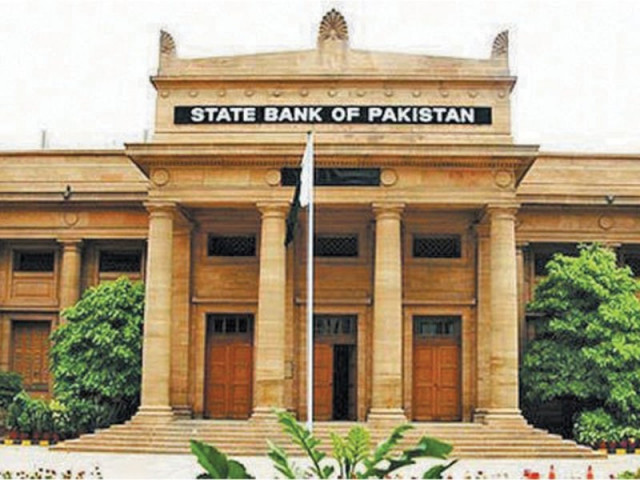Currency rate not discussed with IMF: State Bank
Central bank says exchange rate assumptions have no economic relevance.

The State Bank of Pakistan (SBP), while responding to an article titled “IMF sees 13% depreciation of Pakistani rupee” that appeared in The Express Tribune on July 25, says it gives an impression that according to the International Monetary Fund (IMF) the rupee-dollar parity will be Rs113.7 in FY15.
In a statement, the SBP said according to the story there is no explicit mention of any exchange rate in the IMF’s latest report, adding such exchange rate assumptions have no economic relevance.
“The level of exchange rate is neither discussed with the IMF nor is there any commitment of any sort by Pakistan. The main commitment that Pakistani authorities have made with the IMF regarding balance of payments is about the future path of Net International Reserves (NIR).”
The central bank said Pakistan has met the end-March NIR target by a significant margin of over $700 million and even the IMF in its report has acknowledged this and appreciated the efforts aimed at building foreign exchange reserves. “Provisional estimates suggest that Pakistan has comfortably met the end-June 2014 NIR target as well.”
Like most economies, the SBP said, the day-to-day value of currency is determined by market forces of demand and supply of foreign exchange. While export receipts, remittances and financial inflows are the main source of supply of foreign exchange, import payments and debt repayments constitute a major part of its demand.
Overall macroeconomic conditions together with market sentiments and factors like perceptions of economic stability also influence the behaviour of participants in the foreign exchange market. Most of these factors have improved considerably since March 2014 onwards, it said.
“The SBP does not target any specific level of exchange rate. Our interventions in the foreign exchange market are essentially geared towards dealing with excessive volatility to ensure smooth functioning of the market and build foreign exchange reserves.”
According to the central bank, the IMF not only understands this approach but also advocates market-based exchange rate regime. That is why no discussion takes place on the expected level of exchange rate.
Nevertheless, the SBP said, IMF makes its own assessment of the exchange rate along with the overall economy. IMF uses its assessment of exchange rate for conversion purposes and it does not have any relevance for the economy or value of rupee in the domestic foreign exchange market.
Published in The Express Tribune, July 27th, 2014.
Like Business on Facebook, follow @TribuneBiz on Twitter to stay informed and join in the conversation.



1733130350-0/Untitled-design-(76)1733130350-0-208x130.webp)















COMMENTS
Comments are moderated and generally will be posted if they are on-topic and not abusive.
For more information, please see our Comments FAQ